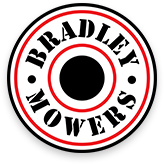The lawnmower can be intimidating for the first-time mower. Mowing a lawn requires sharp eyes and good footing, both of which are good fitness indicators. Many injuries to the hands, wrists, arms, legs, and back can be avoided by following a few simple safety tips. Most injuries that occur when mowing a lawn are from hitting objects like stones, boards, sticks, and toys. The following are important ways to protect against injuries.
Pay Attention
Pay attention to where you're cutting the grass. Avoid doing other things, such as talking to your family or friends. It's easy to get distracted, which can then cause an accident.
Choose a Good Height of Cut for your Grass
A setting of between 1 and 3 is best for most lawnmowers. A setting of 2 or 3 allows for longer blades that catch more grass, but these settings require less pressure on the push-bar. The problem with high settings is that there's more potential for accidents if you have to maneuver the mower in confined areas.
The trick is to learn how to position the mower to allow you to maneuver easily without tipping or spilling over. If you find yourself tipping or spilling over when you turn or stop, reduce the cut's height until you can safely turn and stop the mower.
The ability to control the mower with little movement in confined areas makes it much easier to use on slopes and curbs. Try to mow only in open areas and make wide sweeps with the mower.
Wear Protective Eyewear
Another thing to remember is to wear protective eyewear when mowing a lawn. To avoid damaging your eyes from dirt, insects, and the sun, look for quality protective eyewear with clear lenses and flexible sides that bend around your face.
Never wear loose-fitting glasses while mowing as they will quickly fly off if hit by a tree branch or something else that comes out of the grass.
Cover Your Hands
Another safety tip to consider is protecting your hands with gloves when mowing. This helps protect your hands from bug bites, scrapes, and hand cuts.
Wear Proper Footwear
Proper footwear will protect you from bruises on your feet, especially in cases where you bump into stones that have sharp edges or weeds that have thorns. Don't underestimate the value of shoes for preventing injuries on the lawn.
Put on Hearing Protectors
The icing on the cake would be wearing hearing protectors when mowing your lawn. To some degree, noise-canceling headphones have been known to cause more ear-related injuries than most realize. And yes, they do make a difference in cutting the lawn safely. Do some research before deciding which brand is best for you.
Mower Forward
Pulling the mower backward increases the likelihood of pulling a joint in your lower back and possibly causing serious injury. Mowing forward allows you to push with your legs instead of using your back muscles to move the machine. Using this motion makes it more natural and much less likely to injure yourself in the process.
Mowing should be part of your regular lawn maintenance routine. Remember, it's not just about looks; it's about having a nice healthy lawn that looks good all year long. By being mindful of these things, you will not only keep your yard looking great, but you will also keep yourself safe as well.
